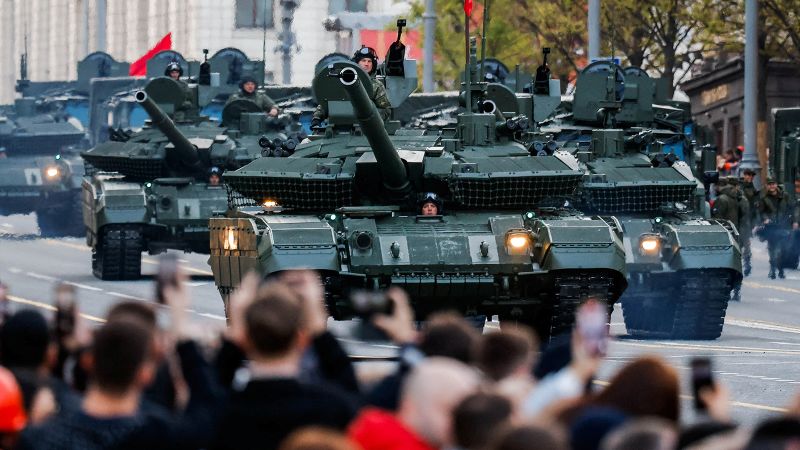Ukrainian Drones Target Moscow Again Amidst High-Tension Military Preparations

In a dramatic escalation of hostilities, Ukrainian drones launched another wave of attacks on Moscow for the second consecutive night, causing significant disruptions and halting flights at four major airports in the Russian capital, as well as additional airports in the surrounding regions. The drone strikes come just days before a monumental military parade set to occur on May 9, which is expected to be attended by prominent world leaders, including China’s President Xi Jinping.
Moscow's Mayor Sergey Sobyanin shared updates via a Telegram post on Tuesday, revealing that Russian air defenses successfully intercepted and destroyed at least 19 Ukrainian drones that approached the city overnight. This follows an earlier incident where four drones were shot down near the capital the night before. Although there were no immediate reports of serious damage or casualties from the drone attacks, Sobyanin noted that debris from the intercepted drones fell onto a major highway, raising safety concerns.
According to the Russian defense ministry, the drones aimed at Moscow were part of a larger assault, with a total of 105 Ukrainian drones intercepted across various locations in Russia overnight. This increase in drone activity underscores the ongoing conflict's volatility and the innovative tactics Ukraine has employed to counteract Russia's military advantages.
This renewed assault on Moscow coincides with Xi Jinping’s anticipated arrival in the city on Wednesday for a state visit that will last three days. The visit includes participation in the Victory Day celebrations on Friday, an event that holds significant importance for Russian President Vladimir Putin. This annual commemoration serves as a platform for Putin to showcase Russia's military might and rally domestic support by honoring the Soviet Union's sacrifices in defeating Nazi Germany during World War II.
Among the other heads of state expected to attend the festivities are Brazil's President Luiz Inacio Lula da Silva, Vietnam's President To Lam, and Belarusian leader Aleksandr Lukashenko. The Victory Day parade is a highly anticipated event, drawing thousands of spectators to the iconic Red Square, where they will pay tribute to the over 25 million Soviet soldiers and civilians who perished during the global conflict.
In light of the recent drone attacks, Russian authorities have preemptively canceled planned Victory Day celebrations in several regions. Notably, the Victory Parade in Sevastopol, located in the occupied territory of Crimea, and celebrations in the city of Krasnador have been canceled as a precautionary measure. Mikhail Razvozhaev, the Russian-appointed governor of Sevastopol, stated that the cancellations were made “for security reasons” as mandated by the defense ministry. Similarly, Krasnador’s governor, Veniamin Kondratyev, expressed concerns over the potential risks posed by the air threat, affirming that the safety of residents and parade participants must be prioritized.
In the lead-up to the Victory Day celebrations, President Putin had previously announced a three-day ceasefire in Ukraine, which he suggested was for humanitarian purposes. However, this declaration was met with skepticism from Ukrainian officials and prompted renewed calls from the White House for a more permanent ceasefire as diplomatic tensions continue to mount. Ukrainian President Volodymyr Zelensky responded critically to the ceasefire proposal, asserting that he was only willing to consider a longer truce lasting at least 30 days.
Zelensky also conveyed a clear message to the dignitaries traveling to Russia for the festivities, stating that Ukraine would not be “playing games” to facilitate Putin's exit from international isolation during the May 9 events. He emphasized that Ukraine cannot be held accountable for events occurring on Russian territory amidst the ongoing conflict.
In a sharp rebuttal, Russia's foreign ministry described Zelensky's remarks as a threat, intensifying the existing tensions. Additionally, Zelensky has called for accountability from China following the revelation that two Chinese fighters were captured by Ukrainian forces in early April, suggesting a potential involvement of Chinese personnel in the conflict. Beijing has since denied any connection to military operations and reiterated its stance urging Chinese citizens to avoid participating in any military engagements.
As the conflict continues to evolve, Ukraine has increasingly turned to drone technology to level the battlefield against Russia’s superior military capabilities. In a notable recent achievement, Ukraine claimed to have downed a Russian Su-30 fighter jet over the Black Sea using an innovative seaborne drone, showcasing its adaptive military strategies.
Moreover, reports emerged indicating that Ukrainian military forces are still active within Russia’s Kursk region, contradicting Moscow's claims of full recapture of the area after extensive military engagements. This ongoing presence highlights the complex and uncertain dynamics of the conflict, with both sides continuing to engage in strategic actions.
This situation remains fluid, and updates are ongoing as CNN continues to cover the developments. Contributing to this report are journalists Anna Chernova, Victoria Butenko, Kosta Gak, Sophie Tanno, Darya Tarasova, Daria Tarasova-Markina, Edward Upright, Sana Noor Haq, and Eve Brennan.


























